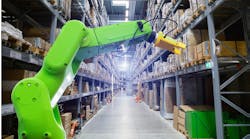Download this article in PDF format.
COVID-19 has taken its toll on the world’s supply chains and pushed many companies to reimagine how they manage and orchestrate these networks. Roughly seven months into the struggle, we’re beginning to hear—through industry surveys and reports—just how impactful the 2020 pandemic has been on those supply chains.
For its new “2020 State of Supply Chain Complexity survey,” Körber polled 1,200 global supply chain professionals to learn how they cope with supply chain complexity, how their solutions stack up against the competition, and how they’re managing the transition from manual to automated processes.
Here are some of the key findings that Körber unveiled in its report:
- 91% of businesses can’t stay ahead of their supply chain complexity. “Supply chain is a critical function in an increasingly digital economy,” Körber says in its report, “but an alarming number of businesses can’t keep up with supply chain challenges.”
- 48% of supply chains have seen their complexity grow in the last year. “COVID-19 doesn’t exist in a vacuum,” it says. “Even in a pandemic, supply chain experts are managing complexities driven by customer expectations and technology integration.”
- 51% of businesses can only tackle one supply chain complexity at a time. “In the warehouse, a hiccup in the picking function won’t wait for a reverse logistics challenge to be fixed,” Körber points out. “But many supply chain experts can’t manage both at once.”
- 48% of supply chain experts continually face challenges with integrating their end-to-end supply chains. “Even with Industry 4.0 solutions,” it says, “the term ‘end-to-end’ [supply chain] gives experts the cold sweats.”
The Mission-Critical Supply Chain
According to Körber, 73% of companies say that within their organizations, senior executives see supply chain as mission critical. “Supply chain complexity is a constant,” it adds, “However, most experts believe their executives see conquering supply chain challenges as a priority.” As
manufacturing and fulfillment complexities continue to grow, other key challenges that companies are grappling with include:
- 48% say they face challenges integrating and ensuring software, materials handling equipment (MHE) and technologies that work together across the entire logistics ecosystem.
- 46% have a difficult time integrating functions across the supply chain—from manufacturing to end-customer deliveries.
- 46% can’t effectively meet consumer expectations for speed, cost, and adaptability.
“Now isn’t the time for supply chains to break under pressure—yet, 48% of companies have experienced growth in complexity this past year,” said Körber’s Rene Hermes in the report. “It’s good to hear so many executives see this business area as mission critical. Now we must transform that understanding into action.”
You Can’t Just Wave a Magic Wand
Supply chain professionals around the world are reporting an uptick in complexity, working harder than ever to move goods from factory to warehouse to the last mile. In fact, half of Körber’s survey respondents globally said their complexity has grown in the last year.
Most supply chain professionals say they’re still trying to play catch up, with more than half saying they can manage, at most, one challenge at a time. “Building the best supply chain for your business has always been a puzzle – but over the last few years, that puzzle has grown from 50 pieces to 500,” Körber adds.
“For many supply chain professionals, integration isn’t only a complexity: it’s their greatest complexity,” it continues. “When given the option of waving a magic wand and eliminating just one supply chain challenge, one in five said they’d eliminate complexity around end-to-end integration.”










